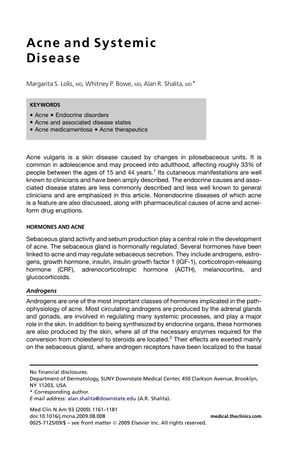Acne and Systemic Disease
November 2009
in “
Medical Clinics of North America
”
acne vulgaris hormones androgens estrogens sebaceous gland PCOS Cushing syndrome endocrine disorders androgen excess SAPHO syndrome Behçet syndrome PAPA syndrome acne medicamentosa oral contraceptives antiandrogens isotretinoin light therapy P. acnes acne polycystic ovary syndrome birth control pills Accutane Propionibacterium acnes

TLDR Hormones, especially androgens, play a key role in acne, which can be a symptom of systemic diseases like PCOS and may require targeted treatment.
The 2009 document examined the connection between acne vulgaris and systemic diseases, emphasizing the hormonal influences on acne development. It noted that acne affects about 33% of individuals aged 15 to 44 and highlighted the role of hormones such as androgens, estrogens, and others in regulating sebaceous gland activity. The paper linked androgens to acne pathophysiology and discussed acne's association with endocrine disorders like PCOS, Cushing syndrome, and others, pointing out that a significant percentage of women with PCOS also suffer from acne. It recommended that clinicians consider PCOS in patients with certain types of acne and conduct a thorough evaluation for androgen excess. Additionally, the document discussed acne as a symptom in various systemic conditions, including SAPHO, Behçet, and PAPA syndromes, and acne medicamentosa caused by medications. It reviewed treatments for acne, such as oral contraceptives, antiandrogens, isotretinoin, and physical therapies like light therapy, while also addressing the challenges of drug-resistant P. acnes and treatment side effects.










